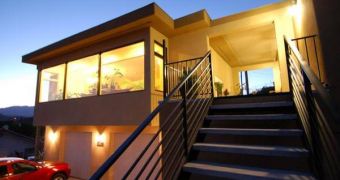In times of crisis, people who have been left without a large part of their life savings lend an ear to house solutions they wouldn't have considered just two or three years ago. For example, Salt Lake City-based Gorilla Designs is taking an innovative approach to supplying its costumers with low-cost homes, via constructing them out of recycled cargo containers and fibrous cement, a mix of paper and a small amount of cement, which offers great insulation.
“After Katrina, we realized that normal houses and traditional materials can't stand up to global warming and the new storms that will come with it. We wanted to make something that could stand the test of time. This is definitely a case of one man's trash being another man's treasure,” a company representative, Roi Maufus, said for Discovery. The company was founded in the aftermath of Hurricane Katrina, when the scale of the disaster meant that a lot of people had to look for cheap homes that could be built relatively fast and last under extreme conditions.
The company chose to base its designs on containers because they were very resistant. The average one is able to hold eight fully loaded others on top of it, and that's a pressure of roughly 376 tons per square inch. In addition, after 10 to 15 years of use, they are discarded by shipping companies and laid to rest in landfills or in deposit areas. This makes them a very cheap and relatively widespread resource throughout the United States, which is one of the main reasons why Gorilla Designs advocates its homes as being less expensive than their new, wood- or concrete-based counterparts.
The houses have nothing in common with the materials they are derived from, the company explains. Upon seeing one for the first time, people almost never realize that it's a structure that has not been constructed out of concrete or wood. The inner structure is made from welded container walls. On top of it, a 12-inch layer of fibrous cement ensures that both warmth and noises are kept inside and outside, respectively. In addition, transporting a pre-assembled one anywhere in the US costs some $3,000, the company claims.

 14 DAY TRIAL //
14 DAY TRIAL //